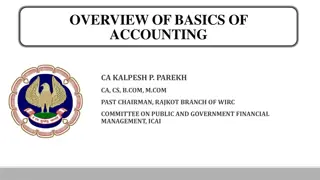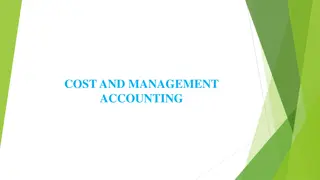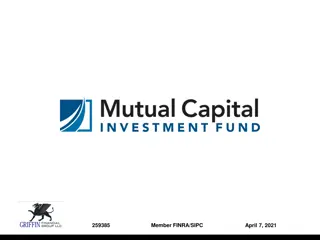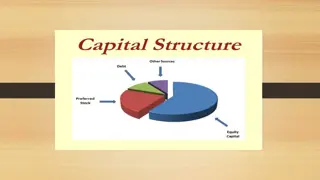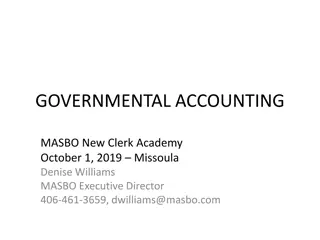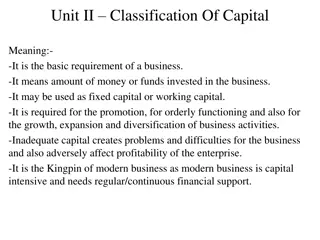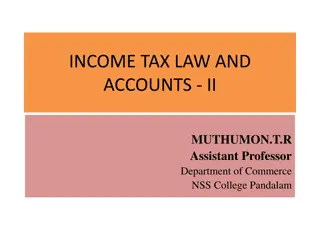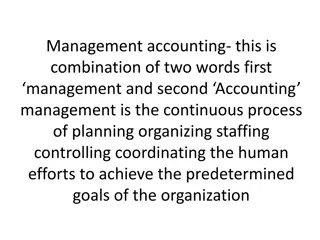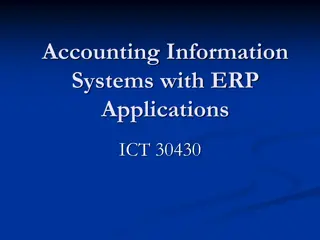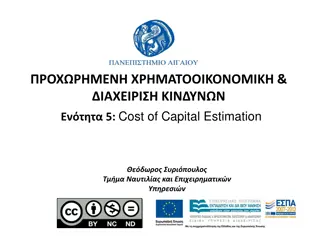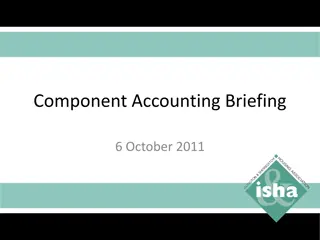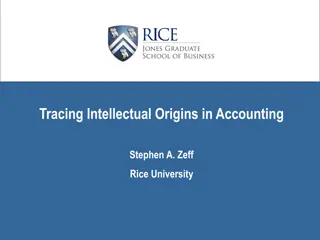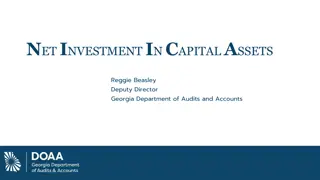Principles of Accounting Accounting
Discover the language of business with accounting principles, functions, and history. Learn the importance of accounting in various economic activities. Explore the role of accounting in tracking finances and making informed decisions for business sustainability.
2 views • 140 slides
Promoting Accounting
Leaving Certificate Accounting is a vital business studies option that equips students with financial analysis skills. Covering topics like Financial Statements, Budgeting, and Management Accounting, this course offers a foundation for a successful career in accounting. With a breakdown of grades an
7 views • 9 slides
CAPITAL STRUCTURE
Capital structure refers to the mix of a firm's capitalization, including debt, preference share capital, equity share capital, and retained earnings. Choosing the right components of capital is crucial based on the organization's function and risk level. Different patterns/forms of capital structur
1 views • 6 slides
Overview of Behavioral Accounting in Business Decision Making
Behavioral accounting is a system aimed at providing financial information for decision-making in business operations. It focuses on the behavior and motivations of individuals involved in accounting systems, catering to both internal and external users for performance evaluation and investment deci
8 views • 104 slides
OVERVIEW OF BASICS OF ACCOUNTING
Explore the evolution of accounting practices from ancient times to modern standards, including the role of Luca Pacioli, industrial revolution impacts, and the establishment of accounting standards by ICAI in India. Discover the basic principles of Generally Accepted Accounting Principles (GAAP) an
1 views • 29 slides
Theories of Capital Structure and their Applications
The theories of capital structure explore the relationship between debt and equity in a firm's financing decisions. By optimizing the mix of debt and equity, a company can minimize its cost of capital and maximize its value. The Net Income Approach highlights the benefits of using debt to lower the
1 views • 7 slides
Factors Influencing Economic Growth: Human Capital and Capital Goods
Factors such as investment in human capital, capital goods, natural resources, and entrepreneurship play a crucial role in determining a country's economic growth. Human capital encompasses the skills and abilities of workers, while capital goods are the tools and equipment used to produce goods and
2 views • 28 slides
Understanding Cost and Management Accounting
Accounting encompasses recording, classifying, and summarizing business transactions, while financial accounting focuses on interpreting financial data for determining profits. Cost accounting involves tracking expenses for product cost determination, and management accounting provides data for deci
7 views • 16 slides
Navigating the Accounting Talent Market with a Recruitment Agency
Navigating the accounting talent market can be challenging, but partnering with an accounting recruitment agency simplifies the process. These agencies offer access to a broad talent pool, expert screening, and industry insights, ensuring you find the best candidates. Their specialized services save
0 views • 8 slides
StartupFino expert Accounting Services in India
Discover streamlined financial management with StartupFino expert Accounting Services in India. From Online Accounting to Bookkeeping, we offer tailored solutions for your needs. Trust us for Best Online Accounting Services and Bookkeeping Services in India, ensuring hassle-free financial management
1 views • 1 slides
Understanding California Community Colleges Attendance Accounting Basics
Explore the importance of discussing attendance accounting basics for California Community Colleges, especially in transitioning to a new academic calendar structure. Discover how scheduling guidelines are influenced by attendance accounting principles and regulations provided by the state. Uncover
7 views • 46 slides
Mutual Capital Investment Fund: Addressing Capital Needs in the Insurance Community
Mutual Capital Investment Fund, LLC, aims to provide capital to mutual insurance companies facing capital needs without converting to stock form or selling minority interests. Led by Mutual Capital Group, the Fund seeks commitments up to $100 million and offers a unique investment opportunity for mu
0 views • 8 slides
Introduction to Accounting Information and Economic Events in Business Firms
This e-learning programme covers the use of accounting information in profit and not-for-profit trading organizations. It explains the meaning of business, types of business firms, economic events, and the definition of accounting. The content also discusses the American Accounting Association's def
6 views • 14 slides
Understanding Cost Accounting Essentials
This overview delves into topics such as financial accounting, classification of accounts, cost ascertainment, and management accounting. It covers the meaning of cost, methods and techniques of costing, advantages and limitations of cost accounting systems, and essentials for a robust cost accounti
4 views • 27 slides
Understanding Book-keeping and Accounting in Business
Book-keeping is the systematic recording of business transactions while accounting involves analysis, interpretation, and communication of financial information. Book-keeping is clerical and routine, done by bookkeepers, while accounting is analytical and requires specialized knowledge, handled by a
4 views • 7 slides
Features of an Appropriate Capital Structure and Optimum Capital Structure
While developing a suitable capital structure, the financial manager aims to maximize the long-term market price of equity shares. An appropriate capital structure should focus on maximizing returns to shareholders, minimizing financial insolvency risk, maintaining flexibility, ensuring the company
2 views • 5 slides
Understanding Risk, Cost of Capital, and Capital Budgeting in Corporate Finance
Explore the concepts of risk, cost of capital, and capital budgeting in corporate finance, including the Capital Asset Pricing Model (CAPM), cost of equity, beta estimation, and cost of capital. Learn how to reduce the cost of capital and understand the impact of reducing the Weighted Average Cost o
0 views • 20 slides
Financial Accounting IFRS Learning Objectives
This educational material covers Chapter 3 of the Financial Accounting IFRS 3rd Edition by Weygandt, Kimmel, and Kieso. It delves into topics such as adjusting the accounts, time period assumption, accrual basis of accounting, fiscal and calendar years, accrual versus cash-basis accounting, and more
0 views • 20 slides
Fund Accounting Overview and Types of Funds in Governmental Accounting
Fund accounting in governmental organizations involves segregating financial resources into self-balancing accounts to facilitate specific activities and objectives. This practice ensures compliance with regulations and restrictions, such as GAAP and state laws. Various types of funds, including gov
0 views • 41 slides
Understanding the Classification and Importance of Capital in Business
Capital is crucial for businesses, whether for promotion, functioning, growth, or expansion. It can be classified as promotional, long-term, short-term, or development capital. Factors influencing capital requirements include business activity, size, product nature, technology, business cycle, and l
2 views • 13 slides
The Critical Role of Human Capital in Economic Growth: A Review
Literature highlights the significance of human capital formation in driving economic growth and achieving macroeconomic objectives. Human capital accumulation enhances productivity, reduces unemployment, poverty, and inequality, underscoring the need for investments in education, health, and job tr
0 views • 25 slides
Capital Gains and Assets Overview in Income Tax Law and Accounts
This content provides an overview of capital gains and assets in income tax law and accounts, covering topics such as types of capital assets, assets not considered capital assets, kinds of capital assets (short-term and long-term), transfer year of chargeability, computation of capital gains, and c
0 views • 15 slides
Understanding Management Accounting and Cost Accounting
Management accounting involves planning, organizing, and controlling human efforts to achieve organizational goals, while cost accounting focuses on determining the cost of products and services. The objective of cost accounting includes cost analysis, reduction, and decision-making support.
0 views • 33 slides
Tips and Tricks for Doing a Literature Review Successfully
Explore valuable insights and strategies shared by Khaled Hussainey, a Professor of Accounting & Financial Management, University of Portsmouth, UK. Gain knowledge on structuring literature reviews, identifying research gaps, developing hypotheses, and conducting systematic literature reviews. Disco
0 views • 66 slides
Working Capital and Current Ratio in Accounting
Understanding indicators like net current assets (working capital) and current ratio is crucial in accounting. Net current assets reflect the ability to settle current liabilities and the capital required for operational functions. Managing working capital effectively involves factors like stock man
0 views • 12 slides
Understanding Cost Accounting: Techniques and Processes
Cost accounting is a specialized branch of accounting that involves the accumulation, assignment, and control of costs. It encompasses techniques like ascertainment of costs, estimation of costs, and cost control to aid in decision-making. Cost accounting plays a crucial role in budgeting, standard
2 views • 11 slides
Fiscal Year 2022 Capital Budget Presentation Overview
In the presentation to the Board of Finance, the Capital Committee outlines the Fiscal Year 2022 draft capital budget, emphasizing the importance of the Capital Improvement Program and the history of the capital program investments. The proposed budget addresses the critical need for reinvestment in
0 views • 11 slides
Introduction to Computer-Based Accounting Systems in Business
Information systems play a crucial role in modern business operations, particularly in accounting. This course covers topics such as setting up accounts, using software like Sage, and analyzing financial data. Computer-based accounting offers advantages such as accuracy and speed, but also comes wit
1 views • 31 slides
Structuration Analysis of Central Government Accounting Practices and Reforms in Emerging Economies: A Study from Nepal
Delve into the nuances of central government accounting practices and reforms in emerging economies, focusing on Nepal. The study explores why key stakeholders resist externally-driven changes, investigates the unintended consequences of reforms, and highlights the role of organizational actors in s
0 views • 21 slides
Introduction to Industrial Costing: Understanding Cost Types and Accounting Systems
Explore the fundamentals of industrial costing, including different cost types and accounting systems such as actual cost accounting, normal cost accounting, and standard cost accounting. Learn about cost data control, tasks of cost accounting, and the integration of cost type accounting in cost and
1 views • 24 slides
Development of Methodologically Robust Agricultural Capital Stock Statistics by FAO
In November 2015, the Food and Agriculture Organization of the United Nations (FAO) initiated a project to enhance Agricultural Capital Stock statistics, focusing on inclusive and efficient agricultural and food systems. The project involves developing methodologies for measuring capital stock and m
0 views • 38 slides
Estimating the Cost of Capital in Corporate Finance
Explore the process of estimating the cost of capital essential for discounted cash flows models in corporate finance. Learn how to determine the cost of debt, equity capital, and the Weighted Average Cost of Capital (WACC) by combining different sources of financing. Gain insights into capital stru
0 views • 59 slides
Evolution of Accounting Practices in Social Housing Properties
Historic accounting practices for housing properties in the social housing sector underwent significant changes prior to and after the accounting period ending 1997/1998. Initially, all property assets were capitalized including major repair expenditure. However, a shift occurred leading to the remo
0 views • 44 slides
Tracing Intellectual Origins in Accounting: A Journey of Thought Evolution
Tracing the intellectual origins in accounting reveals the roots and influences behind current theories and practices. This process involves connecting the dots across decades to understand the intellectual baggage inherited from the past. Different streams of thought in US accounting literature, st
0 views • 41 slides
Understanding Net Investment in Capital Assets and Its Importance
Net Investment in Capital Assets is a critical component of an entity's financial position, reflecting the value of capital assets owned. It represents the portion of the net position that is not spendable as it is invested in assets. Calculating Net Investment in Capital Assets involves subtracting
1 views • 17 slides
Understanding Venture Capital: Key Concepts and Regulations
Venture capital is a form of financing provided to startup companies with high growth potential. It involves high risk and requires a long-term horizon, often coming in various forms like equity, conditional loans, and participation in management. The process includes stages such as seed capital, ex
0 views • 10 slides
Understanding Capital Adequacy Ratio (CAR) in Banking
Capital Adequacy Ratio (CAR) is a crucial metric in banking that measures a bank's capital against its risk. Also known as CRAR, it enhances depositor protection and financial system stability worldwide. The CAR formula involves dividing a bank's capital by its risk-weighted assets, comprising tier
0 views • 7 slides
Understanding Debt Capital in Chapter 8 of Accounting for Managers
Explore the concept of debt capital and liabilities in Chapter 8 of Accounting for Managers by Professor Zhou Ning from Beihang University. Learn about the nature of liabilities, legal obligations, contingencies, and levels of likelihood in financial reporting. Discover how to differentiate between
0 views • 21 slides
System of Environmental-Economic Accounting and Experimental Ecosystem Accounting Overview
The System of Environmental-Economic Accounting (SEEA) and Experimental Ecosystem Accounting aim to integrate biophysical data, monitor ecosystem changes, and link them to economic activities. They provide a framework for accounting for ecosystem assets and services, playing a crucial role in the po
0 views • 34 slides
Importance of Cost Accounting in Business Management
Cost accounting plays a crucial role in modern business environments where cost effectiveness and quality consciousness are vital for success. This branch of accounting helps in planning, controlling, and determining the costs of products or services, providing essential data for efficient managemen
0 views • 6 slides




